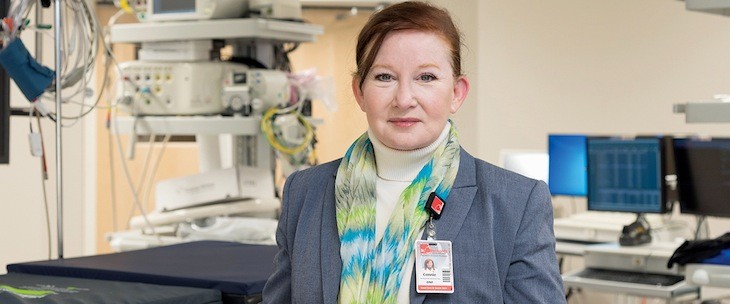Hospital exec shares thoughts on medical advances, Northeast Arkansas assets and obstacles
by May 14, 2018 2:17 pm 1,824 views

Dr. Connie Hill, a vice president at St. Bernards Medical Center in Jonesboro
Dr. Connie Hill is a vice president at Jonesboro-based St. Bernards Medical Center overseeing its heart care and cancer service lines. She also is president of the Arkansas Healthcare Executive Forum. Hill joined St. Bernards in 2011 when her family’s cardiology practice was acquired.
She is an Advanced Practice Nurse (APR), earning her APR degree from UAMS. She holds a master’s degree in business administration from the University of Colorado at Denver and a doctoral degree from Vanderbilt University.
Roby Brock: Let’s talk about heart care. What’s the biggest improvement that we’re seeing in this field, right now?
Connie Hill: I think one of the biggest improvements is that we’re seeing surgeries that previously required an open chest now can be done percutaneously. So, for example, aortic valves can now be replaced percutaneously, where previously that was a six-week recovery. Now, that’s a 24- to 36-hour hospital stay, and the patient goes home the next day. More, and more, and more, we’ll see valves replaced in that manner.
One of the other advances we’ve seen is we have some new drugs out for the treatment of heart failure that have really made a big difference in patients’ lives. And then, on the electrophysiology side, the treatment of atrial fib with the implantable watchman devices, which prevents strokes. Those things have been really a huge deal for us, and a game-changer.
Brock: And on the cancer side?
Hill: On the cancer side, I think, probably the combination of immunotherapy with chemotherapy to really eradicate cancer more quickly and efficiently, and then, also, stereotactic treatment. Rather than a patient’s entire brain being radiated to get at a single spot or lesion, the stereotactic really allows us to hone in from several different beams to be more specific and cause less tissue damage around the tumor.
Brock: Breakthroughs seems to be an every day occurrence, yet we still see too many people die from cancer. Will science and technology, eventually, defeat cancer, in your estimation?
Hill: It’s hard to say, because so much of what happens relative to cancer is influenced by our diets, our environment. So, certainly, we’ve seen big advancements, and I don’t know that it’ll be eradicated. I’d like to think that it would be, but certainly there have been significant improvements, and it would be great if both heart disease and cancer got eradicated in our lifetimes, since those are two of the big killers right now.
Brock: You’re a big advocate of expanding rural healthcare. Is there an economic development component to this?
Hill: I really do believe where you live makes a difference because, for example, there are so many rural areas that absolutely have no grocery store. I mean, you drive through [the area] and it’s a food desert. It’s not uncommon in little towns to drive through and there’s a gas station with a fast food combination. And you think about a person who lives at the poverty level. It’s cheaper for them to go down and buy off of the dollar menu than it is to eat fresh fruits and vegetables.
I hope that our healthcare and access in these communities gets to the point where we’re also partnering with people to do community gardens so we can have people eating fresh fruits and vegetables. So much is tied to our diet, but people just don’t have access to healthcare, they don’t have access to healthy food. And they don’t have sidewalks where they live. People just don’t realize how much it matters, [that] where you live affects your healthcare.
Brock: Give me your take on the health of Northeast Arkansas, and where this region is headed. What’s the biggest asset, what’s the biggest obstacle?
Hill: I think our biggest asset is that we have good leadership. Not only at our hospital, but in our community. We are not dependent on just one area of industry. We’re about a third service, about a third agriculture and about a third manufacturing. And that has really helped us, I think, in times when other communities have seen a downturn in the economy. We have been able to sustain it, because we don’t rely on just one single industry.
Also, Jonesboro Unlimited has really worked to do planning in our community where they’ve recruited, not a plant that might employ 20,000 people, but lots of plants that employ 1,500 and under. Because if one of those [plants] lays people off, again, we can absorb that.
The housing market is very good, the education is excellent, the crime rate is very low. So it’s a great place to live, a great place to raise a family. I think one of the things that hinders us just a little bit is we’re growing so fast, it’s difficult for development of our infrastructure from streets and those types of things to keep up. But we’re getting there.
I read an article that said there’s a segment of our younger population that’s leaving Jonesboro. I don’t see that, but it may be because I’m not looking for it. But I don’t see that.
